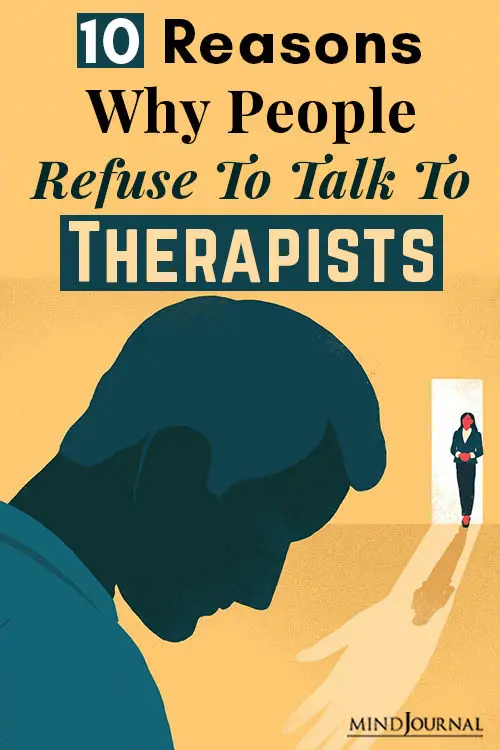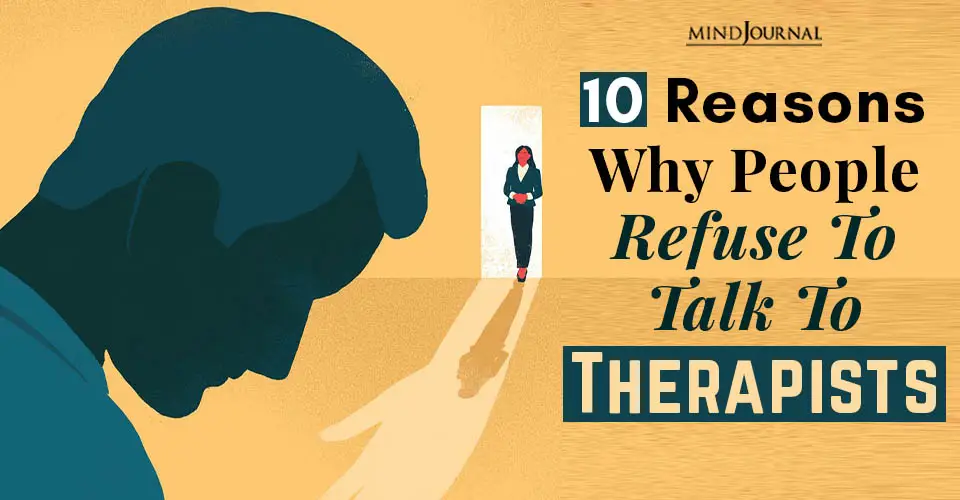I’ve heard it so often over the years: “He’s going through a hard time,” someone will say about a friend, “but he doesn’t believe in psychotherapy.” Or perhaps it’s, “My mom could really use some therapy, but she’d never do that.” As a psychologist in private practice, I often hear stories of people who could really use someone to talk to, but for whatever reason, refuse to see a therapist.
Following are the 10 most common anti-therapy attitudes I’ve heard over the years—along with the reasons why each doesn’t really hold up.
1. “I’d rather talk to my friends.”
Of course, you should talk to your friends and your family. It’s important to find support when times are hard. Therapy doesn’t supplant friendship—but then again, friendship can’t do the work of psychotherapy, either. A therapeutic relationship is more than a friendship: Not only does it provide support, but it challenges you, allowing you to gain valuable insights into yourself.
Therapists are trained listeners who can help you find the source of your problems, even if the source is your thoughts, your family, or you. And your friends aren’t going to sit down to talk about you all the time, every week, are they?
2. “It costs too much.”
All too often, insurance doesn’t cover the full cost of psychotherapy—so it does become an investment in yourself. It’s true that there are times when the expense is not practical, but sometimes, an investment in therapy today can head off much more costly, life-affecting problems in the future.
Related: The 4 Most Valuable Things I Learned From My Therapists
3. “I don’t have time.”
If you have the kind of problems that aren’t going to go away, finding a few hours to deal with them now might actually save you time, as well as money and heartache, in the end.
4. “I saw a psychologist once, and it didn’t help.”
Every psychologist is an individual, with a unique personality, so there’s no reason to believe that a new therapist would fail you in the exact same way that the old one did. Very likely, the person you saw back then was just not someone you could connect with. Another psychologist will, by definition, be different.
5. “What good is talking going to do?”
Lasting personality change does result from psychotherapy, which has been shown in a recent study to reduce neuroticism and increase extraversion. It also often helps just to have someone you trust, who knows you well and with whom you can talk about difficult topics.
The working alliance you forge with your therapist is a relationship, and as you develop that relationship, permanent change becomes possible.
6. “I’d feel weird talking about this stuff to a stranger.”
In my experience, this seems more like a problem than it really is. Most therapists are skilled at making you feel comfortable quickly and do not want to come across as judgmental strangers. If you do have a few sessions with a new therapist but don’t feel comfortable, you can try being open about your concerns, or you can seek out a different therapist.
Therapy is a relationship that is both professional and personal, and the alliance you form with your psychologist is an important factor in the treatment—all of which is to say, it won’t take much time for your therapist to no longer feel like a stranger.
Related: 11 Signs You Need To Talk To A Therapist
7. “Therapists don’t say anything; they just sit there and judge you.”
That depends on what kind of psychologist you’re seeing. Many of them will tell you right off the bat that they like to say what’s on their minds. Many of them offer practical advice or provide detailed feedback about the way they understand you and your problems. Even the therapists who do more listening than talking are not judging you—they are quietly working to perceive your problems your way, empathically.
And if you do feel judged by your therapist, you should bring up those feelings. It might seem uncomfortable at first, but your therapist will most likely be glad to talk about any feelings that arise in the course of treatment—including those brought up by the therapist or the treatment itself.
8. “Therapists don’t really care about you; they do it for the money.”
In general, people choose psychotherapy as a career because they care about other people and want to help. I don’t know anyone who became a therapist to get rich.
9. “If I was depressed and I wanted to feel better, I’d just take Prozac.”
Psychiatric medications don’t work equally well for everyone. Plus, every psychoactive drug has additional effects—also called “side effects,” if you prefer the language used by the pharmaceutical industry—that can be quite serious, like weight gain or sexual dysfunction.
On the other hand, psychotherapy has no chemical side effects and represents an active, positive coping strategy. Even in the cases where psychiatric medication maintenance is the treatment of choice, it often works best when supplemented with weekly psychotherapy.
Related: Top 10 Reasons You Should Conquer Your Fears According to Therapists
10. “I wouldn’t want to air my dirty laundry out in public.”
Psychotherapy is confidential, and the material discussed in therapy sessions is protected by law. As long as you do not present a danger to anyone, what you choose to talk about with your therapist will not leave the therapy room.
Generally speaking, it’s always pretty easy to find a reason not to do something that’s good for you—like exercise, getting a full night’s sleep, or finding a therapist. In my experience, psychotherapy usually helps quite a bit. People who are suffering can forge strong working relationships with their therapists even if they have never tried therapy before.
If you are going through a stressful time, or feel unhappy, anxious, or unsatisfied with yourself and your life, please don’t talk yourself out of taking care of your feelings.
Check out Dr. Soeiro’s personal website www.lorensoeiro.net, for more such informative articles.
Written By Loren Soeiro Originally Published In Psychology Today









Leave a Reply
You must be logged in to post a comment.